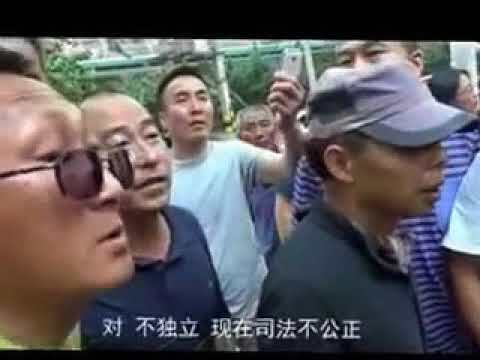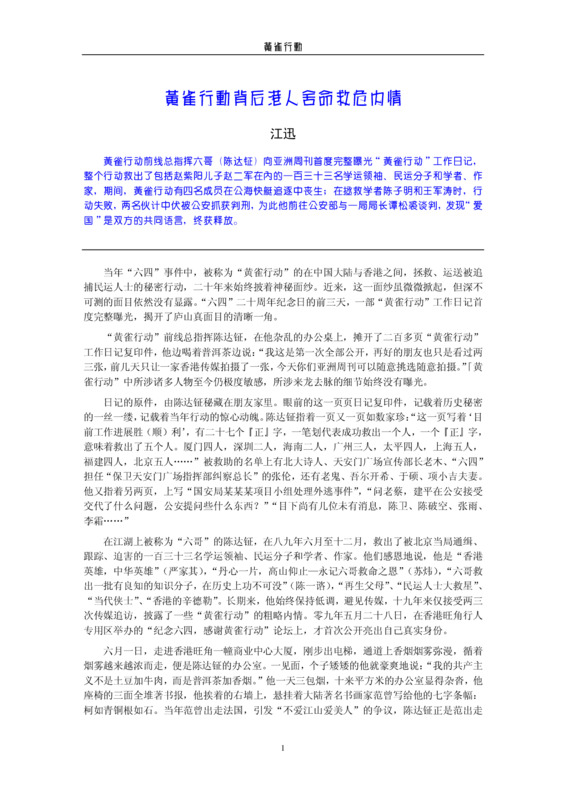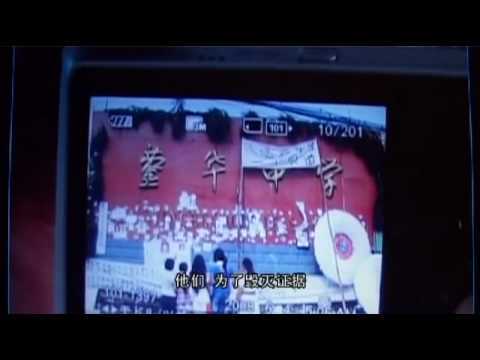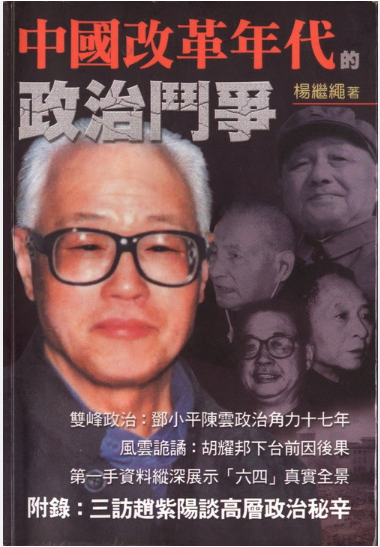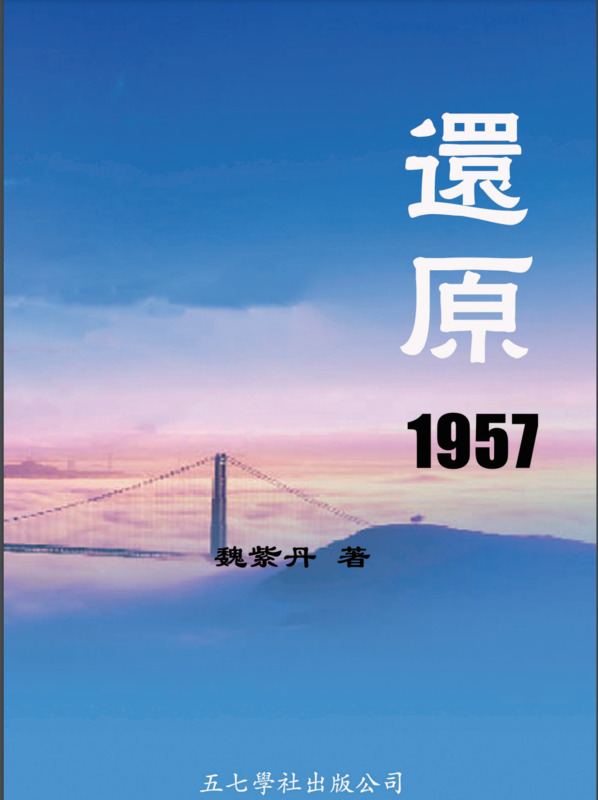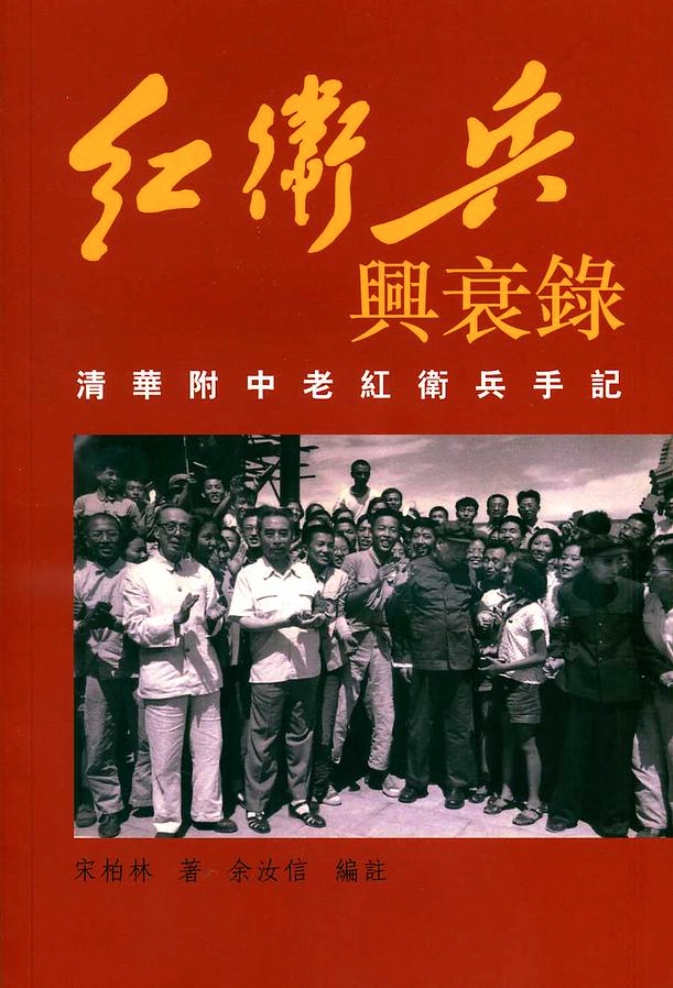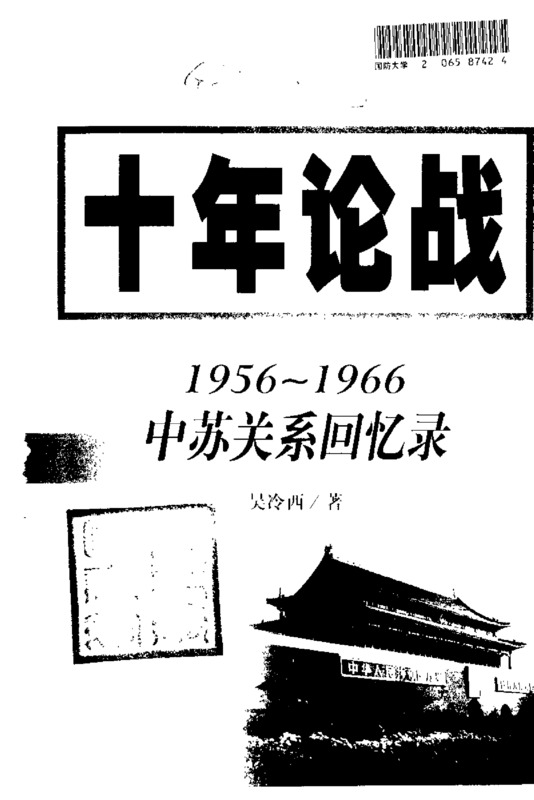Explore the collection
Showing 133 items in the collection
133 items
Film and Video
Onlookers
People from all over China rush to the scene of China's trial of Bo Xilai, the former Chongqing Party Secretary of the Communist Party of China. The trial took place in August 2013 at the Jinan Intermediate People's Court in Shandong Province. Reporter Liu Xiangnan captured the scene.
Article
Operation Yellow Bird
After the bloody suppression of the June 4 Democracy Movement, the Chinese Communist Party went on a massive manhunt for the key figures of the movement. Some Hong Kong people organized a secret channel to help pro-democracy activists escape from the Mainland, codenamed "Operation Yellow Bird." The author of this book, Jiang Xun, is a veteran of the media and describes in detail how the "Yellow Bird Operation" took place.
Article
Oral Interviews with Global Feminists
As one of China's foremost feminist activists and thinkers, Ai was interviewed by the Global Feminisms Project at the University of Michigan. In this interview, Ai talks about her upbringing as well as about the current state of feminism in China and its outlook.
Film and Video
Our Children
This documentary records the stories of the 2008 Sichuan earthquake. The narrators mainly consist of the parents of students who fell victim to the earthquake, and the film is interspersed with comments from media workers, independent scholars, internet authors, geologists, and environmental protection and legal workers. They expressed their views on the Sichuan earthquake from different perspectives.
This film is in Chinese with Chinese subtitles.
Book
Pastor Wang Yi's Anthology: Carrying the Cross - A History of Chinese Family Churches
Wang Yi, of Chengdu, Sichuan Province, is a well-known Chinese intellectual who later became a pastor. The Early Rain Reformed Church that he led was one of the most famous unregistered churches in China. The church occupied the floor of an office building in Chengdu and had its own bookstore, seminary, and pre-school. It regularly had services of hundreds of people. Later, the church had internal conflicts, while at the same time Wang became more outspoken in his criticism of the government. In 2018, he criticized Xi Jinping for abolishing term limits and allowing himself to become ruler of China for life. Pastor Wang was sentenced to nine years in prison in 2019.
This book is based on the recordings of Pastor Wang's classes at Early Rain in 2018. The first five chapters were reviewed by Pastor Wang himself, but he was arrested before he could complete the review of the last five chapters. The essays cover key issues that concerned Wang, including the role of the church in China as a city on the hill, the role of the Reform church in China, and the history of unregistered churches in China.
Book
Personal experiences of political movements
This book is a collection of many authors, most of whom were former senior officials of the Communist Party of China, such as Li Rui, Xiao Ke and others. Through the author's recollections, we can learn about the political movements of the Mao Zedong era, including the Cultural Revolution, the Anti-Rightist Movement, etc., as well as the details of many unjust cases, such as the Hu Feng case, which is quite convincing. This book was published by the Central Compilation and Translation Bureau Press in mainland China in 1998.
Book
Political Struggles in China's Reform Era
The author of this book, Yang Jisheng, is a veteran journalist with 35 years of experience in journalism at Xinhua News Agency, China's official news organization. He knows a great deal about the ups and downs of Chinese politics after the end of the Cultural Revolution as well as the intricate power struggles at the top and has a lot of first-hand information. He personally interviewed Zhao Ziyang, Zhu Houze, Li Rui, Ren Zhongyi, An Zhiwen, Tian Jiyun, and other important people. “Political Struggles in China's Reform Era”, first published in Hong Kong in November 2004, was the subject of a series of crackdowns by the authorities against Yang Jisheng. It was republished in 2010 by Hong Kong's Cosmo Books.
Article
Poppies under the Red Sun: The Opium Trade and the Yan'an Model
In the 1990s, history scholar Chen Yongfa made a fundamental study of the opium economy two decades before the founding of the CCP and completed a monograph, "Poppies under the Red Sun: The Opium Trade and the Yan'an Model". Since then, more and more research articles have been written on the subject, and new information has appeared. Subsequently, the phenomenon of the opium economy of the CCP's Yan'an regime has also became an important field of study.
Film and Video
Postcard
After retiring from her job as a cadre, Wang Lihong fulfilled what she saw as her civic responsibility to become more active in women’s rights in China, especially the protection of their legal rights. In 2009-2010, she became involved in the “Fujian Netizen Case,” which resulted in the arrest of three human rights activists, who all sought to investigate the death of a 25-year-old women believed to have been murdered in a gang rape by men associated with the local police. Wang Lihong wrote letters to the General Secretary of the Fujian Provincial Committee of the Communist Party of China every day for nine consecutive days, calling on the authorities to let them go home for the New Year. For this reason, she was criminally detained by the authorities in March 2011 on suspicion of "picking quarrels and provoking trouble." The case was heard by the Beijing, Chaoyang District People's Court on August 12; nearly a month later, on September 9, the court issued a guilty verdict and sentenced Wang Lihong to nine months in prison. The film documents her case, and raises questions about the accountability of the local government and police. Another one of Ai Xiaoming’s films, “Let the Sunshine Reach the Earth,” documents Wang Lihong’s trial process in more detail.
This film is in Chinese with Chinese subtitles.
Book
Prisoner of the State: The Secret Journal of Premier Zhao Ziyang
“The Course of Reform”, a memoir by Zhao Ziyang, former General Secretary of the Central Committee of the Communist Party of China, was published on May 29, 2009 by New Century Press in Hong Kong. Its English translation, “Prisoner of the State: The Secret Journal of Premier Zhao Ziyang” was published on May 13 before that. According to the book's preface, in 1992, Du Guanzheng, an old subordinate of Zhao Ziyang and former director of the State Press and Publication Administration, together with Xiao Hongda, another former high-ranking CCP official, persuaded Zhao Ziyang, who was under house arrest, to organize his experiences into a book.
Purchase link: https://www.kobo.com/hk/zh/ebook/ZoerWPfG8TiqoXIYwvW2iw.
Film and Video
Ram
The documentary "Ram" was filmed by independent director Tiger Temple in 2016 and is available here in a revised version by the author in 2021. The film documents a real-life incident that took place in Xi'an during the "1983 crackdown". The encounter of the artist Gong Yang (real name Li Xiaoming), the main character of the documentary, is quite representative. It reflects the cruelty and absurdity of the "1983 Crackdown" political campaign launched under the direction of Deng Xiaoping.
Book
Revisiting 1957
<i>Revisiting 1957</i> is not just about the history of the Anti-Rightist Campaign but is also a theoretical reflection on that history. Written by Wei Zidan (the penname for Wei Liyan), the book has three sections: upper, in which the author discusses philosophical problems of the campaign; middle, in which he discusses the origins of the campaign; and lower, which contains his thoughts on lessons for the future. In Wei's view, the people who were declared rightists stood up for freedom of speech. The campaign, therefore, was an assault on freedom of expression and resulted in a human rights catastrophe for China. The book also has an eleven-part appendix with reflections on miscellaneous events.
Wei Zidan was born in Henan Province in 1933 and was a teacher in the Anyang Middle School. He himself was labeled a rightist and brings a unique insider's account of the movement but unlike some personal accounts of suffering, Wei also brings a more analytical approach to the issue.
After moving to the United States in his later years, he collected information and found the freedom to complete this book. Published in Hong Kong in 2013 by the May 7 Society Press.
Book
Rise and Fall of the Red Guards: A Handbook of the Old Red Guards at Tsinghua High School
The Red Guard movement originated in the Tsinghua University Affiliated High School, a secondary school for faculty and staff of the university, as well as others aspiring to attend the elite university, including the sons and daughters of high-ranking cadres. Song Bailin was a senior high school student at Tsinghua High School, one of the founders and a core member of the Red Guards.
Song kept a diary during the first years of the Cultural Revolution. Yu Ruxin, a researcher of the Cultural Revolution, felt that a section of Song Berlin's diary involving the Red Guards of Tsinghua High School was of historical value. Yu decided to publish the diary in its entirety as it was, with no deletion except for the correction of obvious typos. The diary covers the period from May 1966 to February 1968, the launching phase of the Cultural Revolution. A selection of diary entries from January to April 1966 has been included to give a better understanding of the political climate in China on the eve of the Cultural Revolution as well as the ideological trends of high school students.
Because the diary is a historic document directly from an era that is now more than half a century old, the diary lacks historical background and footnotes that might help current readers understand the context of that time. Fortunately, the current publication has a preface written by Luo Xiaohai, who explains the political atmosphere in the years leading up to the Cultural Revolution and some of the key events of that time.
For readers today, the diaries are at times hard to decipher. The Red Guards quickly were criticized by others, including those in power. As the writer Hu Ping notes <a href="https://www.rfa.org/mandarin/pinglun/huping/Hu_ping-20071112.html">in a 2007 review of the book</a>, the reversal of support for the Red Guards must have caused confusion and even a sense of betrayal by many involved. The diary, however, reveals none of this inner turmoil, Hu Ping ascribes the Red Guards' silence to the fact that keeping a diary in that era was a way for participants to prove their revolutionary zeal. Thus they self-censored and wrote with the expectation that their words would be discovered and could be used against them. This means the diary provides little in the way of psychological insights in the Red Guards.
It does, however, provide a way of understanding how totalitarian terror and power works on individual psychology. Thus when his classmates beat classmates and teachers, Song expressed embarrassment that he lacked their fervor and did not participate. This means that the diary is best seen as a primary document that shows the way young people thought at that time, rather than an exercise in self-reflection or criticism.
Book
Science, Democracy, Rationality: Xu Liangying's Anthology
Chinese intellectual Xu Liangying is a scholar of the history of scientific thought and an active warrior in defense of human rights. He weathered China's most extreme political storms and began to speak out again after China opened up slightly in 1977. This book collects his political speeches between 1977-1999. Originally published by Spiegel Publishing in Hong Kong in 2001, the book was later made into a PDF version by Xu Liangying's family in the hope that it would be circulated online to a wider audience.
Book
Seventy Years of the Chinese Communist Revolution
Professor Chen Yongfa's book examines the history of the Chinese Communist Party from the perspective of modern Chinese history. It divides it into three stages: revolutionary seizure of power, continuous revolution, and farewell revolution. It delves into three major issues in CCP history: nationalism, grassroots power structure, and ideological transformation and control. published by Taiwan's Linking Publishing in 2001.
Film and Video
South Side Street
South side Street near Tiananmen Square in Beijing has long been a gathering place for some homeless people as well as petitioners. The director became involved in the homeless relief charity in 2007, and continued to follow the film, which the director finished editing eight years later. The film was selected for the 12th China Independent Film Festival Documentary Competition.
Film and Video
Taishi Village
In the fall of 2005, residents of Taishi Village became increasingly frustrated and angered by the sale of land by village officials; hundreds of villagers signed a petition calling for the removal of the village chief. The villagers occupied the village committee’s financial office and expressed their demands through sit-ins and other forms of protests. The government dispatched the police to arrest village activists, but the villagers insisted on starting a formal recall process. The government finally sent a team to the village to verify the signatures for the petition.
<i>The Taishi Village</i> recall incident generated attention from Chinese and foreign media, and caused uneasiness among local government officials. On September 12, 2005, police arrested dozens of villagers who were participating in a sit-in in the village committee room. Despite the pressure, villagers elected a committee to remove the village committee director. The government then dispatched more men to exert pressure, forcing elected members to withdraw one by one. Hired patrol teams eventually drove lawyers and reporters out of the village.
This documentary records the protest scenes and tragic ending of Taishi village’s movement for autonomy, and presents the surging rights consciousness in rural areas in Guangdong. This incident demonstrates villagers’ ability to exercise their right to vote and the government’s inertial approach to grassroots democracy movements.
This documentary is in Chinese with Chinese subtitles.
Book
Ten Years of War: A Memoir of Sino-Soviet Relations 1956-1966
The author of this book explains the relations between the two parties before and after the 1956-1966 Sino-Soviet War and the main process of the Sino-Soviet War as a first-hand witness. Since Stalin's death and Khrushchev's rise to power, Sino-Soviet relations have been characterized by a series of exchanges over the internal relations between the socialist party and the socialist country, the relations with the "imperialists", how to build socialism, and the national question. As a personal witness to this period, the author tells the truth about history as he knows it. This book was originally published on the mainland in 1993.
Film and Video
The Central Plains
Due to poverty in rural areas in Henan Province—part of China’s Central Plains—many farmers contracted AIDS by selling their blood. This documentary dives into the lives of these AIDS patients, depicting the manner in which they cope with life, officials’ responses, and the stories of volunteers who helped the infected villagers. The filmmaker visited several villages with high incidence of AIDS, interviewing and recording people’s accounts of how the “plasma economy” arose. This documentary presents the living condition of families and individuals, especially women and children, who contracted AIDS due to blood donation and blood transfusions, and demonstrates the formation of grassroots organizations.
This film is in Chinese with both Chinese and English subtitles.
Book
The Collected Works of He Jiadong
He Jiadong is a Chinese publisher. He joined the Chinese Communist Party at an early age. After 1949, he founded the Workers' Publishing House, one of the propaganda mouthpieces of the CCP. In 1957, he was designated as a rightist and later labeled as an anti-Party element. In 1965, Kang Sheng criticized him. He was sent down to Chengwu County in Shandong Province, where he was put under local control for 14 years. During the Cultural Revolution, he was taken back to Beijing and criticized, which affected his family and led to the unnatural death of his mother and two sons. In 1979, after the rightist was corrected and completely rehabilitated, he became the executive vice-president and deputy editor-in-chief of the Workers' Publishing House; in 1983, he founded the monthly <i>Rensheng (Life)</i>. In 1984, he founded <i>Kaituo (Pioneering)</i> magazine. He was investigated for publishing Liu Binyan's <i>The Second Kind of Loyalty</i>, and resigned from his post in 1985. The above weekly newspapers, bimonthly magazines and websites were all suspended and closed by the authorities. He has written a large number of articles exploring China's development path from the end of authoritarianism to constitutional democracy. He himself had a 60-year career as a "red publisher" but never had the freedom to publish. Even his own collection of essays was never published. Until the end of his life, he never saw a printed volume of his essays—the printed books were seized and confiscated by the Chinese authorities.
The book can be purchased <a href="https://www.fellowspress.com/shop1/p/-4"> link</a>.
